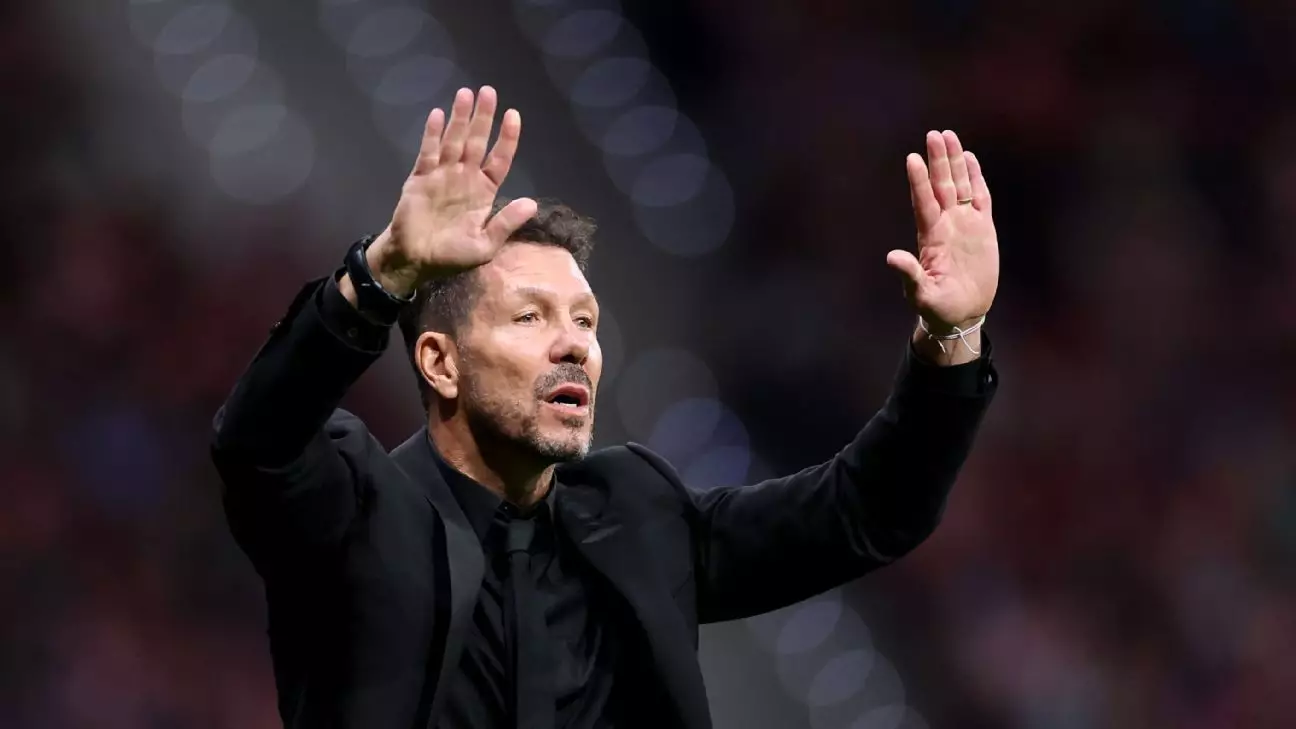In the vibrant world of football, emotions often run high, particularly during rivalries like the Madrid derby. The recent match between Atlético Madrid and Real Madrid, held at the Metropolitano Stadium, was no exception. This fixture is steeped in history and passionate loyalty, but what transpired during this encounter far eclipsed the usual fervor associated with such games. The match was marred by unacceptable behavior from a section of the crowd, culminating in a temporary suspension due to the dangerous throwing of objects onto the pitch.
Diego Simeone, Atlético Madrid’s esteemed coach, did not mince words while addressing this alarming episode. He condemned the actions of fans who escalated the situation by hurling items such as lighters and plastic bottles, suggesting that such behavior not only disrupts the game but also tarnishes the club’s reputation. Simeone’s call for players, especially those who celebrate with provocative gestures, to exercise restraint speaks volumes about the interconnectedness of player behavior and fan reactions. The incident serves as a stark reminder that while the players are performers on the field, they also wield significant influence over a passionate fanbase.
As the match entered its later stages, tensions boiled over. After Real Madrid took the lead with a goal from Éder Militão, it was as if the delirium of support morphed into fury for some attendees. The atmosphere shifted from one of celebration to unrest, reflecting the volatility that can surface when expectations and emotions clash. This anger is often exacerbated by actions on the pitch, underscoring Simeone’s criticism of certain player antics.
Simeone’s remarks emphasize a crucial dynamic in football: the role of players in influencing fan behavior. By suggesting that players should temper their celebrations and avoid confrontational gestures, he highlights a fundamental truth—responsibility for the atmosphere extends beyond the stands and onto the pitch. While he firmly denounced the fans’ actions, he simultaneously acknowledged the need for players to act thoughtfully to mitigate tensions.
The unnerving pause in gameplay set off a chain of responses; temporary communication from stadium officials aimed at restoring order failed to quell the unrest. Simeone’s attempts to appeal to fans directly underline the challenge of mediating such volatile environments, especially when player emotions are ignited by the on-field action.
The ramifications of the incident go beyond the immediate suspension of play. Atlético Madrid released a statement post-match asserting their commitment to identifying the individuals responsible for the disturbances while also reaffirming their dedication to fostering a positive fan environment. The club’s security measures and collaboration with law enforcement illustrate proactive steps taken to address the issue and maintain order.
Moreover, the timing of this incident coincides with broader societal issues, including a recent campaign promoting racial discrimination against players like Vinícius Júnior of Real Madrid. The Spanish league’s involvement in combating such toxicity is commendable, but it also leads to essential questions about the responsibility of clubs, officials, and the players themselves. As historical patterns of racism and hostility rear their heads, a concerted effort is crucial in changing the narrative surrounding the sport.
The Madrid derby is a celebrated event not just for its sporting significance but for the electric atmosphere it typically generates. However, moments like this threaten to overshadow that joy. As FIFA and various football organizations continue to emphasize the importance of creating safe and inclusive environments for players and fans alike, the events of this particular derby serve as a critical case study.
The collective voices within football need to advocate for an environment where passion doesn’t morph into hostility. Constructive dialogues—like the one initiated by Simeone—are steps forward in eradicating harmful behaviors, and they call for introspection at both player and fan levels. As a community that reveres the game, the challenge moving forward will involve ensuring that passion for football coexists with respect and decorum—values that should underpin the beautiful game.
The Madrid derby should be a source of pride, a quintessential clash of talent, strategy, and fervor. The inherent responsibility we all share—players, fans, and officials—must be taken seriously. Only through accountability and mutual respect can we hope to protect the integrity and enjoyment of football for future generations.

